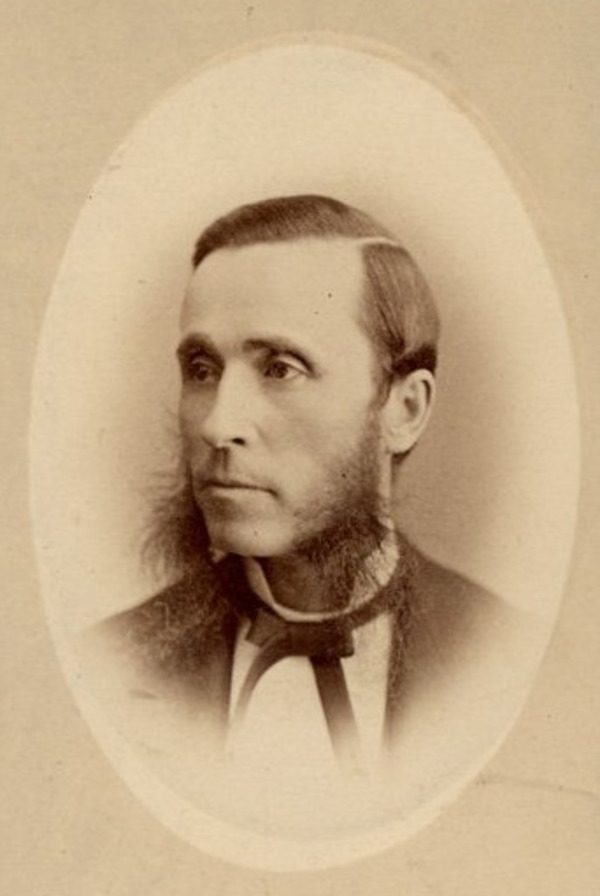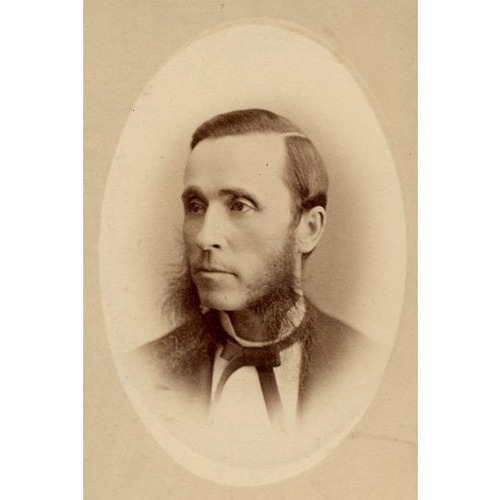
Source: Link
BACHAND, PIERRE, lawyer and politician; b. 22 March 1835 at Verchères, L.C., son of Joseph Bachand, a farmer, and Josephte Fontaine; d. 3 Nov. 1878 at Saint-Hyacinthe, Que.
After spending his youth at Saint-Damase, where his family lived, Pierre Bachand entered the college of Saint-Hyacinthe, but had to leave the institution before the end of his classical studies. He then began to study law under the direction of Louis-Victor Sicotte*, who had a strong influence upon his professional and political career; he was called to the bar on 3 Dec. 1860. While studying law, Pierre Bachand held at Saint-Hyacinthe the posts of deputy protonotary of the Superior Court and assistant clerk of the Circuit Court; he gave up these offices in 1862 when he entered into partnership with a lawyer of his own age, Jean-Baptiste Bourgeois, who became a judge of the Superior Court in 1876. In 1859 Bachand had married Delphine Dufort, who died in 1864, and in 1868 he remarried, his second wife being Marie-Louise Marchand, daughter of Louis Marchand, a Montreal broker. According to contemporary descriptions, Bachand was a dark-haired man, rather slender, calm, serious, active, and loquacious.
Bachand built up a large clientele for himself throughout the whole county, among both the agricultural population and the industrialists. With the advantage of railways and a number of plants using water-power, Saint-Hyacinthe experienced rapid growth, especially after 1870; its principal industries were shoe, furniture, and carriage factories, tanneries, some foundries, a brewery, and an organ works [see Joseph Casavant]. At the end of August 1871, with a view to promoting this industrial development, Bachand and a few prominent citizens set up the Chamber of Commerce of the district of Saint-Hyacinthe. But it was by starting the Banque de Saint-Hyacinthe that Pierre Bachand took the greatest part in the economic development of his region; this bank, which officially began financial operations on 27 Jan. 1874, made rapid progress despite the economic crisis. Bachand was its president until his death, and when in February 1878 he presented his annual report, he was able to compare the bank favourably with several much older ones. He was also active in the Société Saint-Jean-Baptiste of Saint-Hyacinthe, and was a member of its executive committee for several years.
A pupil of Louis-Victor Sicotte, Pierre Bachand, while still young, had a hand in partisan struggles. Although he shared the fears of the Rouges about confederation, he avoided identifying himself with the radical group of this party. The creation of a provincial government marked the beginning of his parliamentary career; he canvassed successfully for the provincial mandate of Saint-Hyacinthe, triumphing over Magloire Lanctôt, a supporter of the government and a lawyer highly regarded by the bishopric of Saint-Hyacinthe. In 1867 the majority of radical Liberals aspired to a seat in the House of Commons, whereas the moderate Liberals, including Bachand, turned rather towards the provincial house. Bachand rallied to confederation and, influenced by Félix-Gabriel Marchand* of Le Franco-Canadien, for a while urged that an end be put to the partisan struggles in the Legislative Assembly of the province of Quebec. In 1871 and 1875 his mandate as an mla was renewed without opposition.
In the house, Bachand stood out as one of the chief critics of the members of the government. During the first two sessions he was spoken of as one of the possible leaders of the opposition; it was not until March 1869 that the Liberals constituted themselves the official opposition, and they chose Henri-Gustave Joly* as their leader; Bachand and Marchand were his principal lieutenants. Throughout his parliamentary career, Bachand stressed the necessity of a reduction in the expenses of the provincial government, which had limited sources of revenue at its disposal; only a prudent budgetary policy could avoid too frequent recourse to direct taxation, the surest road to legislative union. On several occasions Bachand outlined the dangers that threatened the province’s autonomy. A tenacious adversary of the double mandate, he considered the power of disallowance vested in the federal government baneful and urged the provincial cabinet to free itself from the tutelage of the central government. Bachand was interested in modernizing agriculture, was alarmed at the disastrous emigration of French Canadians to the United States, demanded that justice be administered in a less costly way and made more accessible, and argued that greater attention should be given to primary education and to “industrial and commercial education.”
Although a provincial representative, Bachand did not remain aloof from the political struggles on the federal scene. Thus, on the occasion of the “Pacific Scandal” [see Cartier], he was a leading figure on the hustings in the Saint-Hyacinthe region, together with his associate, Jean-Baptiste Bourgeois, the “Danton of the Reform party,” and Honoré Mercier*, whose reputation as an orator already extended beyond the frontiers of the county. Bachand took part in the organization of the Parti National at the end of 1871 [see Cartier] and was a member of the council of the reform association of the Parti National of Montreal.
During the session 1877–78, Charles-Eugène Boucher* de Boucherville’s government had to face the violent attacks of the opposition, who criticized the laying of the railway between Quebec and Montreal and the famous bill of the attorney general, Auguste-Réal Angers*, which forced municipalities to pay the subsidies promised for the building of the railway; on this occasion, Joly entrusted Bachand with the task of leading the Liberal troops in the attack. Following Lieutenant Governor Luc Letellier* de Saint-Just’s “coup d’état,” which dismissed the administration of Boucherville, Joly offered Bachand the post of provincial treasurer; it was the first time a Liberal and a Francophone had held this office. He defended the lieutenant governor’s position vigorously, and assumed such an importance in the Liberal cabinet that the newspapers spoke of the “Joly-Bachand administration.”
In the 1878 election Bachand had to face an outstanding candidate in his county: Antoine Casavant, a farmer from Saint-Domingue, nephew of Joseph, a member of the agricultural council of the province, and active in several industrial undertakings. Casavant could appeal to the solidarity of the agricultural class, and bank on a certain rivalry between the town of Saint-Hyacinthe and the surrounding country districts; Bachand, however, won with a majority of 68 votes. On 18 June 1878, during the stormy session of that year, he made his financial report, and set at $2,334,041 the financial estimates for the following year: it was the first time the budget speech was delivered in French in the Legislative Assembly of the province of Quebec. Ill and exhausted, Bachand found it difficult to take part in the business of the session, and the preparation of the budget required considerable effort on his part. On 3 Nov. 1878, after an illness of some months, he died at the age of 43. His funeral took place on 6 Nov. 1878 at Saint-Hyacinthe.
PAC, MG 30, D62 (Audet papers), 3, pp.131–32. Le Courrier de Saint-Hyacinthe, 31 août, 14 sept. 1867; 31 déc. 1869; 16 févr., 22 juin, 5 nov., 7 nov. 1878. L’Événement (Québec), 1er mai 1868, 13 déc. 1869, 13 mars 1878. L’Opinion publique (Montréal), 14 nov. 1878. Le Pionnier de Sherbrooke, 8 nov. 1878. Can. part. comp., 1878. Auguste Achintre, Portraits et dossiers parlementaires du premier parlement de Québec (Montréal, 1871), 24–26. C.-P. Choquette, Histoire de la ville de Saint-Hyacinthe (Saint-Hyacinthe, Qué., 1930), 292–96. Rumilly, Hist. de la prov. de Québec, I, II.
Cite This Article
Marcel Hamelin, “BACHAND, PIERRE,” in Dictionary of Canadian Biography, vol. 10, University of Toronto/Université Laval, 2003–, accessed April 2, 2025, https://www.biographi.ca/en/bio/bachand_pierre_10E.html.
The citation above shows the format for footnotes and endnotes according to the Chicago manual of style (16th edition). Information to be used in other citation formats:
| Permalink: | https://www.biographi.ca/en/bio/bachand_pierre_10E.html |
| Author of Article: | Marcel Hamelin |
| Title of Article: | BACHAND, PIERRE |
| Publication Name: | Dictionary of Canadian Biography, vol. 10 |
| Publisher: | University of Toronto/Université Laval |
| Year of revision: | 1972 |
| Access Date: | April 2, 2025 |



